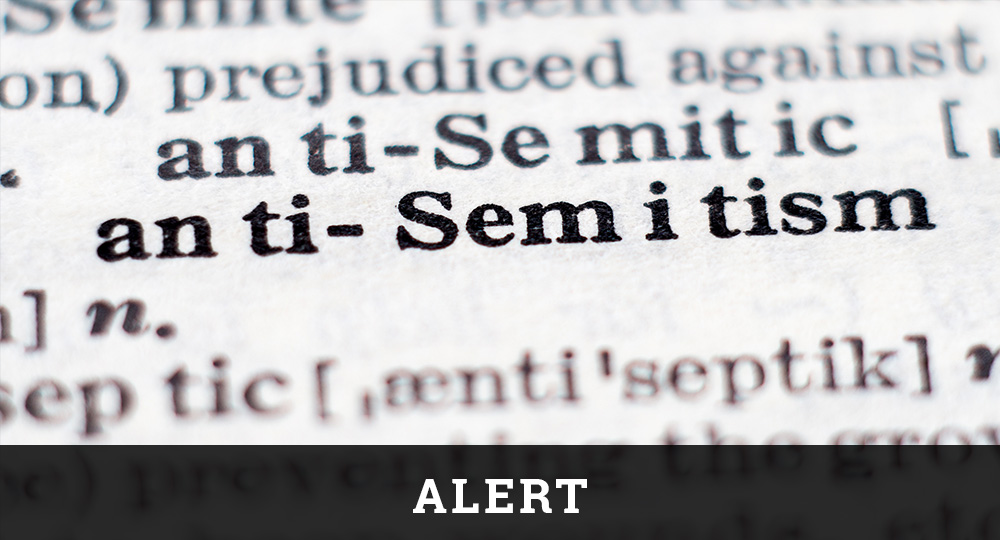The Battle to Define Antisemitism
If we were to title the last 10 years of American cultural history, we might dub them “The Age of Redefinition.” From the Supreme Court’s 2015 redefinition of marriage to the current cultural confusion about simple terms like man and woman, the past decade has been characterized by battles over the meaning of words.
One front in the war centers on the term antisemitism—or is it anti-Semitism? The debate surrounding the use or nonuse of a hyphen in the term has generated a buzz because that little mark sends a message, often subliminally, about the nature and identity of the Jewish people.
In her 2019 book, Antisemitism: Here and Now, Ambassador Deborah E. Lipstadt, U.S. Special Envoy to Monitor and Combat Antisemitism, noted, “In most cases the right side of a hyphenated word can stand alone as a word in its own right,” such as in “anti-immigration, anti-trade, or anti-taxes.”
But “Semitism”? There’s no such thing. Yet Israel’s enemies weaponize the concept of “Semitism” to conceal their animosity against the Jewish people.
As Lipstadt points out, some Arabs erroneously claim, “It’s impossible for them to be antisemitic because they themselves are ‘Semites.’” However, German journalist Wilhelm Marr popularized the term antisemitism in the late 1800s to describe his hatred not of Arabs, Amorites, Arameans, or any other alleged “Semitic” people, but of the Jewish people.
Dropping the hyphen better articulates that Jews are not a “Semitic race” and more precisely defines antisemitism as hatred of the Jewish people.
It’s a step in the right direction, though only a small one. Yair Rosenberg wrote in The Atlantic, “Time and energy spent on [the battle to dehyphenate antisemitism] would be much better spent on combatting anti-Semites and educating allies.”
To do so, the Biden administration issued the U.S. National Strategy to Counter Antisemitism (NSCA) in May 2023. The document says it constitutes “a whole-of-society effort to combat antisemitism, including unprecedented, coordinated, and bold actions that will be implemented across government agencies, as well as calls to action for . . . Americans from every sector, industry, and walk of life.” However, some argue the document fails to accurately define the very hatred it purports to thwart.
The administration rightly uses the International Holocaust Remembrance Alliance’s definition of antisemitism. This definition includes certain anti-Israel/anti-Zionist activities, including “denying the Jewish people their right to self-determination,” “applying double standards” to Israel, “using the symbols and images associated with classic antisemitism . . . to characterize Israel or Israelis,” comparing “contemporary Israeli policy to that of the Nazis,” and “holding Jews collectively responsible for actions of the state of Israel.”
However, the administration also “welcomes and appreciates” the Nexus Document, a Left-leaning definition of antisemitism that does not consider anti-Zionism inherently antisemitic. Dr. Ruth R. Wisse, distinguished senior fellow at the Tikvah Fund and one of the NSCA’s most thoughtful critics, wrote of Nexus:
This “kick me” document assures anti-Semites that “criticism of Zionism and Israel,” “even contentious, strident, or harsh criticism of Israel for its policies and actions, including those that led to the creation of Israel,” plus “opposition to Zionism and/or Israel,” or “paying disproportionate attention to Israel and treating Israel differently”—none of this is dangerous.
The Nexus Document’s authors only view anti-Zionism as antisemitism “when Israel is singled out because of anti-Jewish hatred.” They fail to understand that anti-Zionism is anti-Jewish hatred itself.
Cultural redefinition has left carnage in its “progressive” wake, demonstrating that defining terms correctly matters. One thing is for sure—God views the Jewish nation and the land of Israel as inextricably linked. He preserves both land and people and promises judgment on those who plunder either of them.







